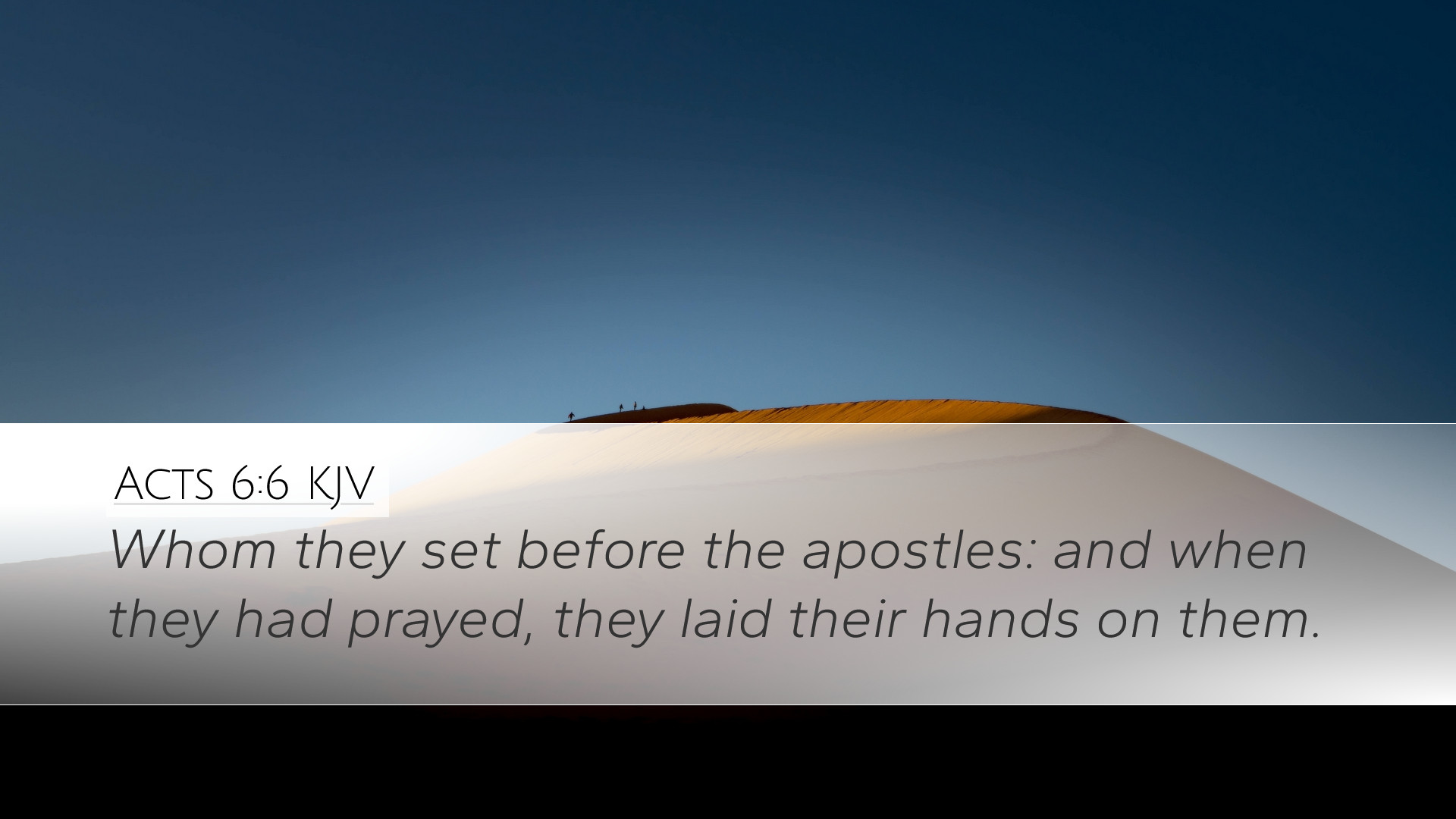Old Testament
Genesis Exodus Leviticus Numbers Deuteronomy Joshua Judges Ruth 1 Samuel 2 Samuel 1 Kings 2 Kings 1 Chronicles 2 Chronicles Ezra Nehemiah Esther Job Psalms Proverbs Ecclesiastes Song of Solomon Isaiah Jeremiah Lamentations Ezekiel Daniel Hosea Joel Amos Obadiah Jonah Micah Nahum Habakkuk Zephaniah Haggai Zechariah MalachiActs 6:6
Acts 6:6 KJV
Whom they set before the apostles: and when they had prayed, they laid their hands on them.
Acts 6:6 Bible Commentary
Commentary on Acts 6:6
Acts 6:6 states: "Whom they set before the apostles: and when they had prayed, they laid their hands on them." This verse occurs in a critical moment in the early church, marking the establishment of a system to address the needs of the community while maintaining the primary focus on the preaching of the Gospel.
Contextual Background
This event transpires shortly after the apostles’ ministry began to face challenges due to the growing number of believers and the accompanying social issues. The proposal to appoint deacons arose due to complaints regarding the distribution of food to widows, particularly the Grecian widows who felt they were neglected.
Commentary Insights
The Selection of Deacons
According to Matthew Henry, the choice of these seven men was critical for maintaining unity within the church. The listing of their names signifies their importance to the congregation and the trust placed in them by the apostles. Each of them exemplifies diverse backgrounds yet shared a commitment to the faith, emphasizing that the church’s leadership can include individuals from various ethnicities and backgrounds.
Spiritual Authority of the Apostles
Albert Barnes comments on the acts of prayer and the laying on of hands, which signifies a formal recognition of the deacons by the apostles. This action is not merely ceremonial; it underscores the spiritual authority vested in the apostles and highlights the seriousness of the task entrusted to the newly chosen deacons. This practice reflects a vital aspect of church governance where spiritual leadership acknowledges and honors the service of others within the body of Christ.
Importance of Prayer
Prayer is a prominent theme in this passage. Adam Clarke emphasizes that the apostles sought divine guidance before setting apart these men for service. This illustrates the necessity of seeking God’s direction in decision-making, particularly in church matters. It underscores that leadership roles should be filled through both practical qualifications and spiritual discernment, crucial for the functioning of the church.
Significance of Laying on of Hands
The act of laying on hands has significant implications. Matthew Henry notes it symbolizes the transfer of authority and responsibility. By performing this act, the apostles not only recognized the qualifications of the selected men but also prayed that they would be empowered to fulfill their roles effectively. This tradition continues in church practices today, symbolizing commissioning and endorsing leadership within the church community.
Unity and Service within the Church
As the early church faced disputes, the establishment of the deaconate model as found in Acts 6:6 served as a foundation for unity. Albert Barnes adds that through effective leadership, the church could focus on its primary mission of evangelism while ensuring that the needs of its members were met. Acts suggests that leaders must facilitate service in the community to preserve the church's health and mission.
The Role and Qualifications of Deacons
Adam Clarke explains that the deacons were chosen based on specific qualifications, including character, wisdom, and spiritual maturity. Their role was not limited to mere administration but was integral to the church’s mission. This passage encourages modern churches to consider the character and calling of those they appoint to leadership positions carefully.
Theological Implications
Acts 6:6 serves as a vital reference point for understanding church governance, emphasizing that spiritual matters should not be neglected in practical ministry. The passage teaches that leadership within the church should be approached with intentionality and prayer, highlighting the sacredness of community service and the ordained structure of church governance.
Modern Applications
Pastors and church leaders can draw from Acts 6:6 in their practice today:
- Engaging in Prayer: Decisions regarding church leadership and service roles should always be enveloped in prayer, seeking the Lord's guidance.
- Recognizing Spiritual Authority: Ensuring that any appointment of leaders is done with the acknowledgment of spiritual authority and a commitment to the church's mission.
- Promoting Unity: Addressing conflicts and needs within the church community before they escalate, fostering an environment of unity and love.
- Understanding the Role of Deacons: Identifying the importance of the deaconate and establishing roles that allow for effective community service and burgeoning church growth.
Conclusion
Acts 6:6 serves as an essential lesson not only in the structure of the early church but as a timeless teaching on the need for spiritual and practical balance in church life. By grounding their decisions in prayer, recognizing the diverse nature of church members, and fostering unity through service, modern churches can draw rich insights from this significant passage.


